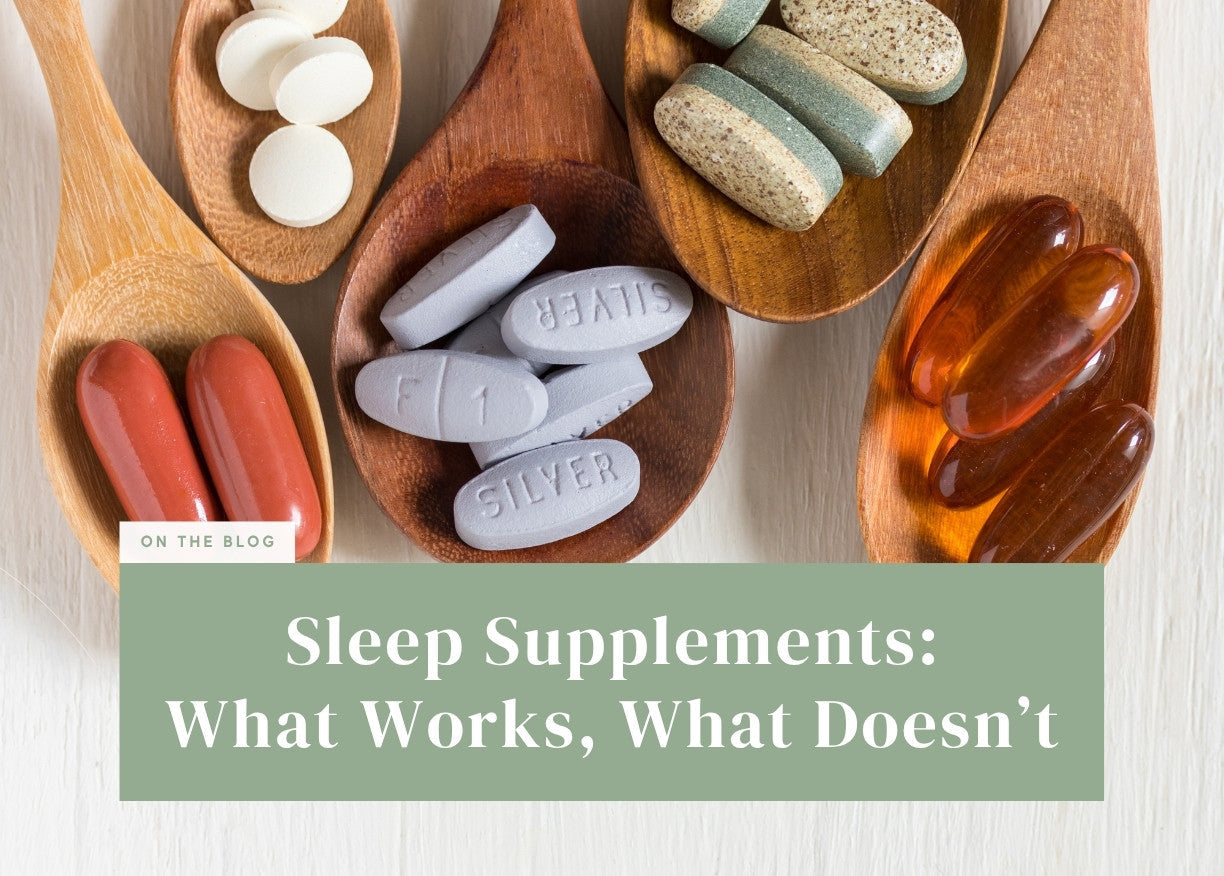Sleep Supplements: What Works, What Doesn’t
It’s 2:17 a.m.
You’re lying in bed, mind wide awake, again. You wonder if a melatonin gummy might help—or maybe magnesium?
Or is that just wasting time?
Sleep supplements can help—if you know which one matches your specific problem.
But not all of them work the way people think.
In this guide, we’ll break down the most popular sleep supplements, what they actually do, and when (or if) you should take them.
1. Melatonin

Best for: Jet lag, shift work, or resetting your body clock
Melatonin is a hormone your brain produces naturally when it gets dark.
The supplement version doesn’t put you to sleep—it signals your body that it’s time to wind down.
✅ Helpful if your circadian rhythm is off (late nights, early mornings, travel)
❌ Not great for chronic insomnia or middle-of-the-night wakeups
Start with 0.3 to 1 mg (yes, really—most doses are way too high)
2. Magnesium

Best for: Anxiety, muscle tension, restless legs
Magnesium calms the nervous system and helps regulate GABA, a sleep-promoting neurotransmitter.
✅ Try magnesium glycinate or magnesium L-threonate for best absorption
✅ Can help you fall asleep and stay asleep
May cause stomach issues if taken in high doses or as magnesium citrate
If you’re low in magnesium (most of us are), this one’s a game-changer for both sleep and overall health.
3. L-Theanine

Best for: Racing thoughts and stress before bed
This amino acid, found in green tea, promotes relaxation without sedation.
It’s especially helpful for people whose anxiety keeps them awake.
✅ Can be taken alone or combined with melatonin or magnesium
✅ Non-drowsy, so it’s safe even if you wake up in the middle of the night
100–200 mg about 30–60 minutes before bed works best
4. Glycine

Best for: Body temperature regulation and deep sleep
Glycine helps lower your core body temperature—a natural signal that it's time to sleep.
✅ May help you fall asleep faster and improve sleep quality
✅ Bonus: Improves cognitive function the next day
Try 3 grams about 30–60 minutes before bed (tasteless powder or capsule)
5. Valerian Root

Best for: Mild insomnia and calming the nervous system
An herbal remedy that’s been used for centuries, valerian root can act as a gentle sedative for some people.
✅ Useful for people who struggle with stress-induced sleep problems
❌ Can cause grogginess in the morning for some
Takes a week or more of consistent use to see full effects
6. 5-HTP

Best for: Mood-related sleep problems
5-HTP helps the body produce more serotonin, which converts to melatonin.
It’s commonly used for sleep issues caused by anxiety or mild depression.
✅ May help with both sleep and mood
❌ Should not be mixed with antidepressants (SSRIs)
Always consult your doctor before trying this one
7. CBD (Cannabidiol)

Best for: Stress, pain, inflammation, and calming the mind
CBD won’t knock you out, but it may help you relax enough to fall asleep.
✅ Helps reduce anxiety and chronic pain—common causes of poor sleep
❌ Effects vary depending on dosage and product quality
Look for full-spectrum, third-party tested CBD for best results
Which Should You Try First?
It depends on your sleep issue:

Bonus Tip: Support Your Sleep Naturally Too
Supplements aren’t a magic fix—but they can help when combined with the right sleep environment.
🌿 A mattress that supports your spine, a breathable pillow, and calming nighttime routines all matter.
✨ At Sweet Zzz, our Honey Hybrid Organic Mattress is a favorite among people who struggle with back pain, overheating, and restless nights.
And if you're looking to upgrade your pillow, our Plant-Based Pillow is breathable, supportive, and made from natural materials—perfect for pairing with your sleep supplements.




